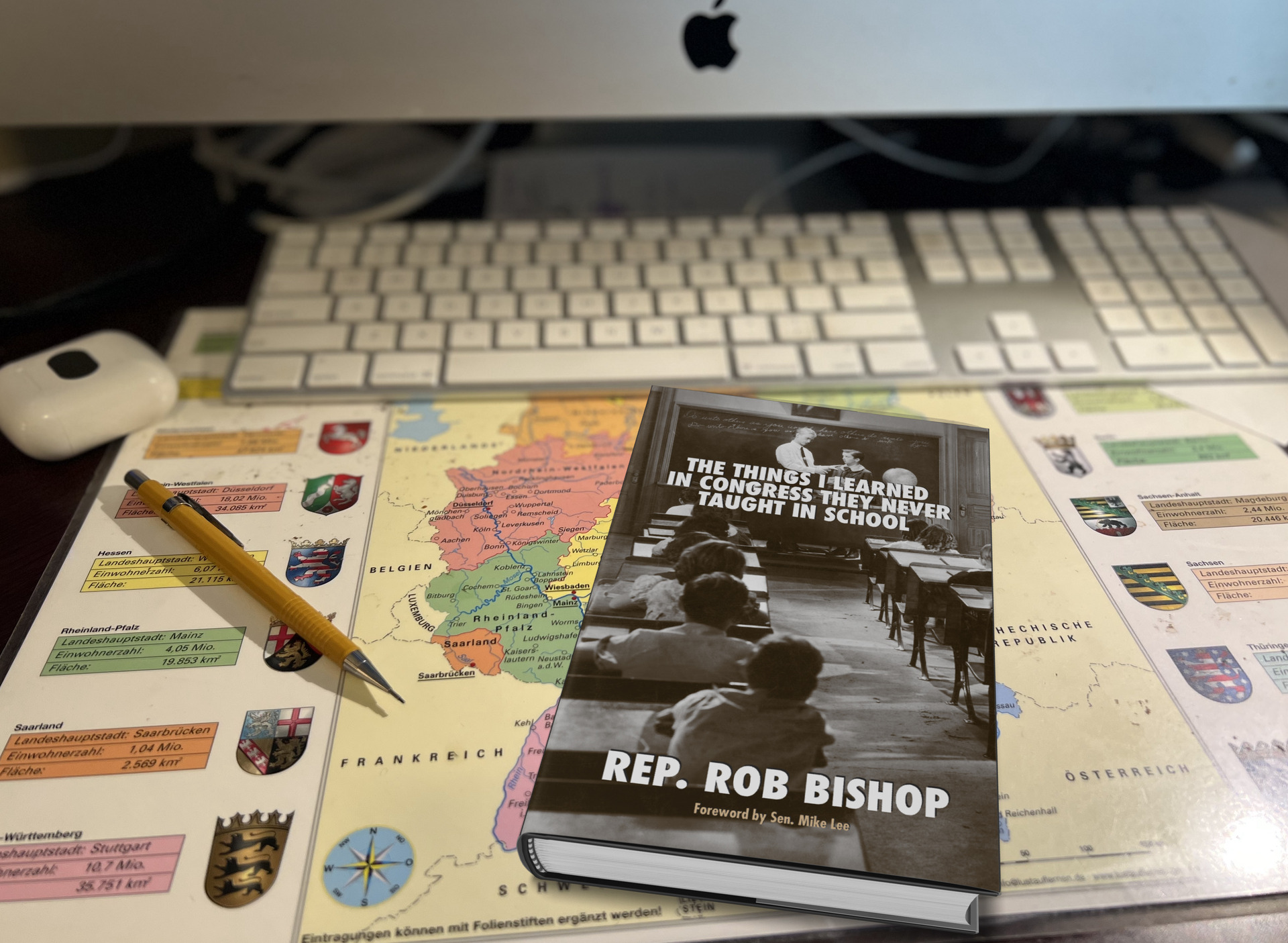Former nine-term Congressman in Utah’s First Congressional District, Rob Bishop, is releasing details about his journey to Washington, D.C., in a 500+ page book that took him 18 years to write.
“It began as a journal., but it’s more than that,” the 72-year-old Brigham City, Utah, former teacher said. “It really was an intellectual journey that began long ago before I was first elected to Congress in 2002. I served in the Utah State Legislature for 16 years, the last two as its Speaker while teaching high school courses in history and government for more than two decades. So, I thought I knew all about the Federal government and how Congress works. I was in for a surprise.”
That explains the book’s title: The Things I Learned in Congress They Never Taught in School.
He first examines closely the framework of how the Constitution was created. Quoting Justice Antonin Scalia, Bishop reminds us that “the Constitution is a legal document–not a living organism–it says some things and not others.” For example, he reminds his readers that “Liberty” was not a license for unlimited behavior. Such would have been synonymous with mob rule. For Jefferson, “liberty” had a political meaning… There was balance among branches of government, and balance between state and national government (Federalism). If the balance was off, individual liberty was in jeopardy. Ignore Federalism and one did not respect “liberty.”
Bishop also explains what Jefferson meant by “the pursuit of happiness:”
“He wrote of political concepts, not social. ‘Happiness’ most likely meant property. In the 5th Amendment and John Locke’s work, the Declaration’s poetic form was written as pursuit of property. The purpose of government was to protect personal property not make everyone giddy. If the people really understood the concept of “the pursuit of happiness,” they would not permit such things as allowing the Army Corps of Engineers or EPA to arbitrarily deny an American the right to use his/her own property by declaring it ‘wetlands.’”
Quoting Daniel Webster, he reminds us how unique Americans are in the course of human history to enjoy such Constitutional-protected rights: “Hold on, dear friend, to the Constitution…Miracles do not cluster. What happened once in 6,000 years may never happen again.” John Adams held the same view, as he expressed it in a letter to his wife Abigail: “How few of the human race have ever had an opportunity of choosing a system of government for themselves and their children? How few have ever had anything more of a choice in government than in climate?”
As unique as the creation of the Founding documents was, it still requires a delicate balancing act to keep everything running like a clock, Bishop says. As he explains both vertical and horizontal balance (between the Federal government and the States, and among the three branches of government, including the unelected “Deep State,”), it’s not surprising that things can get “out of whack.” He details that in chapter 4, “Facing Nanny Government, Progressivism & Loss of Values.” Bishop parts ways with both Theodore Roosevelt and Woodrow Wilson whose views of the nation-state differ from anything the Founders proposed. As the Speaker of the House, Joe Cannon, said regarding Roosevelt (they served concurrently), “Roosevelt had no more use for the Constitution than a tomcat had for a marriage license.” Roosevelt’s view was that “in all national matters of importance…the nation is to be supreme over state, county, and town alike…”
Wilson, according the Bishop, followed lockstep after Charles Darwin in matters of government, who opined that whenever we discuss the structure or development of anything,…we consciously or unconsciously follow Mr. Darwin; but before Mr. Darwin, they followed Newton.” Balance and order didn’t fit Wilson’s view: he preferred Darwin’s chaotic view of nature and the survival of the fittest.
It wasn’t that these so-called Progressives didn’t understand the Constitution. They just didn’t like it.
Bishop looks at the organization, the structure, the arcane rules and whims of leaders as they come and go, and Byzantine order of how things get done–or don’t–in Congress. He introduces the reader to a whole new vocabulary that you don’t ever learn until you take the oath of office, things like presiding prerogatives, PILTs and log-rolling. And, in case you want to go to D.C. and sit in the gallery and listen to inspiring speeches, don’t waste your time. As one Congressman moaned, “we don’t read bills any more, we just wave as they pass by.” The representatives usually give their speeches to empty seats and 12 people watching on CSPAN.
He describes in detail how things have gone awry in Washington…things like rolled votes, executive orders, lazy and obscure language in legislation that lets agencies “fill in the blanks,” no end dates set for bills that have been introduced and no regard for “Equal Footing” as described in the Constitution nor compensation for “regulatory taking.” He prescribes some remedies that Congress and voters can take.
But, woven throughout his detailed examination of what the Founders set forth and the brilliance of their unique place in history is a reverence for the “operating manual” that, despite our often clumsy execution of their Divine plan, has given 300 million plus Americans the best opportunity any people anywhere have ever had to pursue happiness as they see fit.
Rob Bishop’s congressional memoir, The Things I Learned in Congress They Never Taught in School, will be available from Amazon and local bookstores in early October for $25.95 in paperback and as an Ebook next year. A hard copy is also planned to be released in 2024.
For more information, contact GM Jarrard at Preservation Books –– (801) 688-5436
